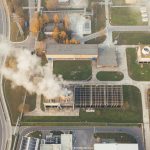- IoT Sensors for Environmental Monitoring
- Vertical Farming Systems for Space Optimization
- Aquaponics for Sustainable Nutrient Cycling
- Automated Drip Irrigation Systems for Water Conservation
- Cloud-Based Farm Management Software for Data Analysis
Urban Farming in Leeds: Must-Have Smart Tech for Sustainable Local Food
Urban farming has seen an exponential rise in recent years as cities strive to create sustainable sources of local food. In Leeds, a city known for its commitment to environmentally friendly initiatives, urban farming is becoming an integral part of the local food landscape. To enhance the efficiency and productivity of urban farms in Leeds, incorporating smart technology is crucial. Smart technology offers innovative solutions to optimize resource usage, monitor plant health, and improve overall yields. Let’s explore some must-have smart tech for sustainable urban farming in Leeds.
IoT Sensors for Environmental Monitoring
One of the key challenges in urban farming is ensuring optimal environmental conditions for plant growth. IoT sensors play a vital role in monitoring crucial parameters such as temperature, humidity, light levels, and soil moisture. These sensors provide real-time data that can help urban farmers make informed decisions regarding irrigation, ventilation, and lighting. By leveraging IoT sensors, urban farms in Leeds can create the ideal microclimate for their crops, leading to healthier plants and higher yields.
Vertical Farming Systems for Space Optimization
Space constraints are a common issue in urban farming, especially in a densely populated city like Leeds. Vertical farming systems offer a smart solution to maximize space utilization while increasing crop yields. By stacking plant beds vertically, urban farmers can grow a larger quantity of plants in a smaller footprint. These systems often incorporate automated irrigation, nutrient delivery, and grow lights, allowing for efficient vertical farming in urban settings. Implementing vertical farming systems in Leeds can help urban farms produce a significant amount of fresh, local produce within limited space.
Aquaponics for Sustainable Nutrient Cycling
Aquaponics is a sustainable farming technique that combines aquaculture (fish farming) with hydroponics (soil-less plant cultivation). In this system, fish waste provides nutrients for plants, while the plants filter and clean the water for the fish. Aquaponics creates a closed-loop ecosystem that minimizes water usage and eliminates the need for synthetic fertilizers. By integrating aquaponics into urban farms in Leeds, farmers can achieve a symbiotic relationship between fish and plants, resulting in a sustainable and efficient farming operation.
Automated Drip Irrigation Systems for Water Conservation
Water scarcity is a pressing issue globally, making efficient water management essential for urban farming practices. Automated drip irrigation systems offer a smart solution for delivering water directly to the plant roots, minimizing water wastage through evaporation or runoff. These systems can be programmed to provide precise amounts of water at optimal times, ensuring that plants receive adequate moisture without excess water. By implementing automated drip irrigation systems, urban farms in Leeds can conserve water resources while promoting healthy plant growth.
Cloud-Based Farm Management Software for Data Analysis
To optimize farm operations and make data-driven decisions, urban farmers can benefit from using cloud-based farm management software. These platforms allow farmers to collect, analyze, and visualize data related to crop growth, environmental conditions, and resource usage. By gaining insights from the data, farmers can identify trends, detect potential issues early, and optimize farm performance. Cloud-based farm management software enables urban farms in Leeds to streamline their operations, improve efficiency, and ultimately enhance their sustainability practices.
In conclusion, urban farming in Leeds can greatly benefit from the integration of smart technology solutions. By utilizing IoT sensors, vertical farming systems, aquaponics, automated irrigation systems, and cloud-based farm management software, urban farms can enhance productivity, conserve resources, and promote sustainable local food production. With the right combination of smart tech, urban farming in Leeds has the potential to revolutionize the way we think about food cultivation in urban environments.



